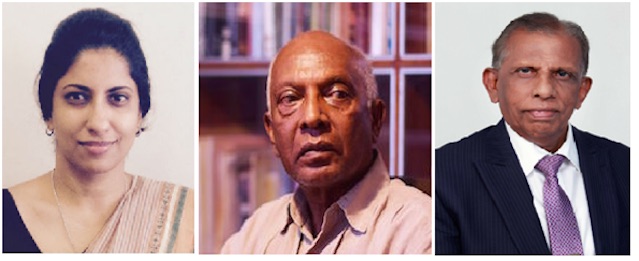Sri Lanka’s Constitutional Reform: New Wine In Old Wineskin?

The Managers’ Forum in Nallur, Jaffna had Lal Wijenayake, Winston Pathiraja, and Yuresha Fernando speaking on Sri Lanka’s Constitutional Reform Process on 23.04.2017. Considering the deficient and unfair system in place underscored by human-rights violations for decades, constitutional reform is necessary to safeguard the rights of all citizens. The current 1978 Constitution even after the 19th amendment, has a powerful president, making degeneration into tyranny all the easier as seen by the last ruler. The 1947 and 1972 constitutions favored a parliamentary form of government, however the power was with the majority Singhalese who abused their power to discriminate and disenfranchise Tamils. The challenge lies in creating a constitution that addresses the needs of all Sri Lankan people. Most (according to the PRC) feel this is best done through power sharing. Zeid Ra’ad Al Hussein, the UN High Commissioner for Human Rights, felt “this process presents an opportunity to rectify structural deficiencies that contributed to past human rights violations, and reinforce guarantees of non-recurrence such as strengthening civilian oversight over the military.” All three speakers emphasized that human rights be given the foremost place when writing this constitution.
Reform Process:
Yuresha Fernando, Additional Secretary to the Constitutional Assembly, gave an overview of the reform process. In January 2016, the Cabinet of Ministers created the Public Representations Committee for Constitutional Reforms (PRC) to consult with the people regarding what they want to see in the new Constitution. PRC travelled to all 25 districts seeking submissions through public consultation. These findings are then reported to the Constitutional Assembly, Steering Committee, and the Sub-Committee.

Yuresha Fernando, Lal Wijenayake and Winston Pathiraja
On 09.03.2016 Parliament passed a Framework Resolution to establish an outline for the Constitutional Assembly when drafting the Constitution and set up the Steering Committee to prepare a Draft Constitutional Proposal. The Constitutional Assembly is chaired by the Speaker Karu Jayasuriya, aided by seven Deputy Chairmen. A panel of seven experts was established to advice the Constitutional Assembly, who may call upon other experts or consultants as well. The Steering Committee is chaired by Prime Minister Ranil Wickremesinghe and has 20 others.
Last November, the PRC reported its findings to the six sub-committees established by the Constitutional Assembly. These sub-committees then deliberate and recommend improvement on fundamental rights, judiciary, law and order, public finance, public services, and center-periphery relations. The Constitutional Assembly can also consult its panel of experts.
The Steering Committee compiles all this and presents an Interim Report with proposed principles for constitutional reform to the Constitutional Assembly, who may then return it to the Steering Committee with amendments. Once amendments have been made, the final report is resubmitted to the Constitutional Assembly with a proposed draft constitutional proposal and bill. If this draft is approved by two-thirds of the Constitutional Assembly, it is submitted to the Cabinet of Ministers and then Parliament and the Constitutional Assembly will be dissolved. If the draft is approved by a simple majority, it will be reconsidered in Parliament within one month. The Cabinet of Ministers presents it before Parliament as a Bill to replace the constitution. This bill then has to be passed by two-thirds majority in Parliament, and then approved by a Referendum.

